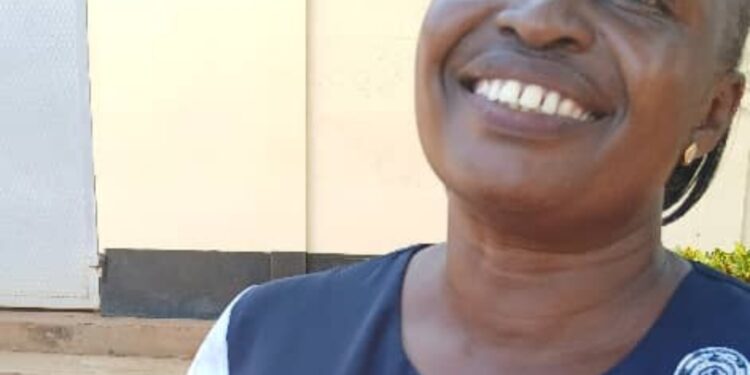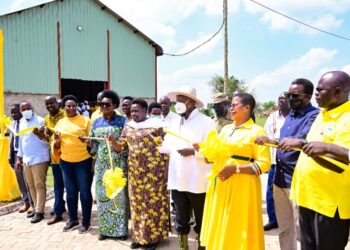THE head teacher Iganga SS Nakaziba Monic Kaiira has urged stakeholders to help mitigate the problem associated with managing menstruation among school going girls.
“…some parents are not supportive and for single parents, especially the males, the girls are not always free to discuss issues to do with menstrual hygiene…”, Nakaziba pointed out.
The head teacher who also doubles as the Biology and Chemistry teacher was speaking during a thanksgiving service dubbed “Zero Pregnancies” held Sunday at the school.
Saying the issue of menstrual hygiene affects the levels of quality of education, Madam Nakaziba (as she is fondly called) urged stakeholders to help the school in designing a programme that will help the girls manage their menstrual hygiene and the No Pregnancy strategy.
In Uganda and most developing countries, adolescent girls face a wide range of challenges that may compromise their chances of completing school or their sexual reproductive health.
These challenges can be even further complicated by girls’ feeling of shame about their bodies, in particular about menstruation, or their lack of sanitary products to help them manage menstruation.
Amidst all the non academic challenges the teenage girls face, the BoG chairperson Hon Dr Victoria Ssekitoleko urged the students to use their power to resist all temptations that confront them.
“…use your power and use it wisely, you cannot succeed in your academic and life’s dreams when at the same time you are the same person indulging in sexual escapades with every man…”,the veteran politician who served for nearly 10 years as the minister of agriculture in the early years of NRM government.
The UNICEF Country Representative Dr Mohamed El Munir A.Safieldin who was the guest of honor used the occasion to implore the young girls whom he described as “the lucky ones” to focus on studies.
He said one of the things that upset UNICEF so much is the rampant cases of dumping new born babies in garbage skips which must be condemned by everyone because its criminal and sinful.
“…do not be part of those girls and criminal families who are killing new born babies because they realize it’s a responsibility they cannot carry, so the best is to prevent pregnancy and concentrate on your education…”the UNICEF representative appealed.
What You Need To Know:
He also used the ceremony to explain the acronym UNICEF which was created on 11 December, 1946 by resolution of the United Nations General Assembly after World War II.
Dr Mohamed El Munir A.Safieldin said originally it was known as the United Nations International Children’s Emergency Fund (UNICEF) as a temporary relief fund of the UN.
In 1953 UNICEF became a permanent part of the United Nations system when the name was shortened to the United Nations Children’s Fund.
The UNICEF chief explained that due to public demand, UNICEF has retained its original acronym which has since become a global household name.
Iganga Senior Secondary School
Iganga SS also referred to as Iganga Girls School is one of the oldest “O” and “A” level secondary schools in Iganga Municipality, Iganga district founded by the Church of Uganda, under Central Busoga Diocese.
The school motto is “Aim To Serve Your Country” and the school mission is to provide quality and diversified educational opportunities to the girl child and children with special needs. The vision is “the epitome of holistic excellence.
A Brief look at Menstruation:
Menstruation is an integral and normal part of human life, indeed of human existence. Menstrual hygiene is fundamental to the dignity and well being of women and girls and an important part of the basic hygiene, sanitation and reproductive health services to which every woman and girl has a right.
According to experts, globally, approximately 52% of the female population, that is,26% of the total population is of reproductive age. Most of these women and girls will menstruate each month for between two to seven days.
Experts also say in an average woman’s lifetime she will menstruate during some 3,000days.
However, the subject of menstruation is more often regarded as taboo, and has many negative cultural attitudes associated with it, including the idea that menstruation women and girls are ‘contaminated’, ‘dirty’ and ‘impure’.
Although a lot has changed for the better due to increased awareness and education, women and girls in rural settings and in particular girls in schools suffer most from stigma and lack of services and facilities to help them cope with the physical and psychological pains they undergo during their menstrual periods.
Some of the problems they face include inadequate preparations for young girls not yet experiencing menstrual hygiene, lack of or inadequate water to clean and wash the body, lack of materials for managing menstrual hygiene, no private space and wash rooms and inappropriate facilities for disposal of materials for those who have used pads.
According to the 2020 data from the Ministry of Education and Sports, three out of four school-age girls(day schools) miss two to three days a month due to menstruation.
The same statistics shows that up to 65%of girls and women in Uganda feel unable to afford adequate menstrual protection.
Do you have a story in your community or an opinion to share with us: Email us at editorial@watchdoguganda.com













